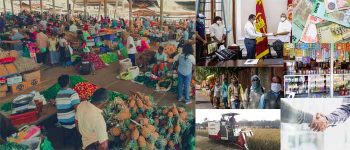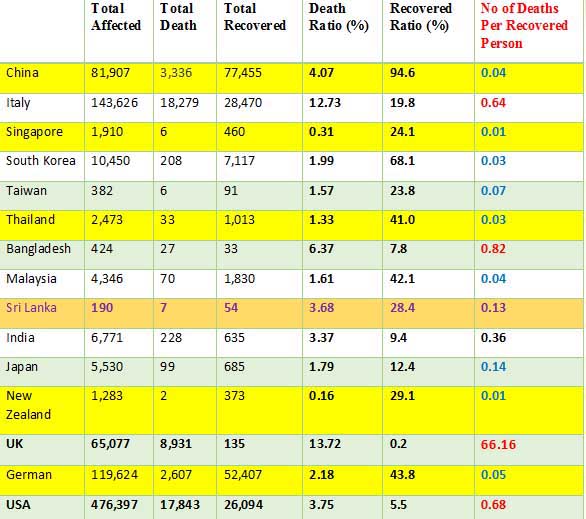Sri Lanka: Victory Against the COVID 19: Get Ready for Hardwork to Make the Country Better


The Coronavirus COVID-19 outbreak has become the most devastated disaster in the world and its socio-economic development recent past, affecting millions of people in different ways with different intensities. By today (10th April 2020) it has create the shocking dead for nearly 102,051 people in the world while 1,684,010 persons have been affected.

Unfortunately, still the whole world is at the initial stage of this deadly virus and not yet found any vaccines/drugs in the pipeline against for COVID-19. On the other hand, the disaster is rapidly growing by making the whole world in an array of misery and leading toward severe economic recession and collapse. The Coronavirus COVID-19 is affecting more than 200 countries and territories around the world. Even though as less numbers of new cases in China where the virus mushroomed initially is currently reporting inside of the country, the virus is spreading exponentially in most of the developed countries such as Italy, Spain USA, UK (more than doubling approximately every four days).
“Doing the Right Things” and “Doing Things Right”
At the Response Stage on Coronavirus COVID-19, the main target is to provide immediate assistance with most effective ways of facilitation and supports to maintain normal life ensuring the health and safety of the people. Successful solutions to ensure the basic needs of the people is fundamental to make all these endevours a great success. Both Strategic Thinking (Doing the Right Things) and Tactical Thinking (Doing Things Right) aremomentouslydecisive in this context.
Capacity Threshold and Flattening the Curve

It is useful to exactly identify “How Far” and “How Fast” the virus can be manageable at the current resources and facilities. This task has been successfully carried out by the health authorities with the support of professional association like SLMC.
Flattening the Curve: “Flattening the Impact Curve” of deadly Coronavirus COVID-19 can do much faster through proper public awareness and education. This will encourage people to do useful measures to ensure their
Social Distancing. This has already proven as one of the most effective strategies to control Coronavirus COVID-19 in South Korea, Japan, Taiwan and Singapore. These countries have successfully controlled the large outbreaks of this virus by flattening the Impact Curve of new infections, without using China’s draconian restrictions and possibly economically damaging lockdowns.
Social Distancing and Self-Isolation will have a considerable impact to flatten the Impact Curve of deadly Coronavirus COVID-19 in our country.
Sri Lanka, as the First Country in South Asia, imposed a nationwide weekend curfew on Friday (March 20) by clearly understanding the gravity and seriousness of possible impact of deadly Coronavirus COVID-19. Government started advising the public to stay home and avoid going to malls unless essential, so as to curb local transmission of the virus. The SLMC and other professional associations have provided necessary consultations to the authorities being a part of decision-making process under the President’s Task Force of Coronavirus –COVID 19. There have been so many requests to the public to take safe distancing seriously and the advisory sent via the government media and all kinds of other media channels including WhatsApp, Viber social media.
Lessons Learned from the Regional Success
In consideration of this Global Health Security (GHS) Index (https://www.ghsindex.org/), Human Development Index (HDI) and Per Capita Nominal GDP, a comprehensive comparison of the actions taken by several countries in Asian Region, namely, China, South Korea, Singapore and Taiwan can be carried out herewith with the most affected country in the European region, Italy on the purpose of getting clear understanding of successful lessons against the Coronavirus –COVID 19.
China has proven that the Coronavirus –COVID 19 can be stopped in its tracks and the course of the outbreak can be altered. The development of the outbreak is not given an opportunity to reach its high peak of danger if the health services are provided overwhelmingly at right time to right people valuable to the virus by ensuring its Triage effort.
COVID-19: Lowest Death Ratio and Highest Recovered Ratio
In this context, the most successful countries for having LOWEST DEATH RATIO and HIGHEST RECOVERED RATIO are New Zealand, Singapore, Thailand, South Korea, China, and German.
Comparison between Death & Recovered Ratio and No of Deaths Per Recovered Person

Specific effective actions taken by successful countries to control COVIC 19 can be summarized as below:

Sri Lanka: Setting a Global Example for Victory against COVID-19

Sri Lanka is facing a current viral pandemic of Coronavirus COVID-19 as of 10th April 2020, 190 confirmed cases have been reported in the country. On 3rd March 2020, as the first reported case involving a Sri Lankan origin outside Sri Lanka was reported in Italy, nearly 45 quarantine centres have been built in the country by the Sri Lanka Army as a preventive measure to tackle the coronavirus pandemic. Nearly 4000 people have been under quarantine in 45 quarantine centres which also include 31 foreigners from 14 countries. .As of 26th March 2020 Sri Lankan authorities have tracked down over 14000 people who had contacted the identified patients and had ordered be self-quarantined for such people.
Following the first reported case of Coronavirus COVID-19 in Sri Lanka on 27 January, demand for face masks in the country soared and the country began to face a severe mask shortage. Face masks were being sold at over ten to twenty times than the original price. As a result, the country’s drug regulatory agency placed price controls on face masks as well.
It is very important to realize that such shortcomings are common to many countries at the beginning and very few countries are manifesting a greater speed in actions to control the Coronavirus COVID 19.
“Doing the Right Things” and “Doing Things Right”
It has been strongly emphasized by the WHO and health experts that it is advisable to wear a protective mask in public whenever and wherever possible. If the country doesn’t have enough supply of protective face marks already as reported and evidenced through severe shortages, one of the priorities of the actions must be focused to supply the required protective masks with right qualities, rather than debating on whether the Wearing Mask is useful to prevent Coronavirus COVID 19 or not. Such method has been successfully applied in Japan, Singapore, South Korea, Thailand and Taiwan. Furthermore, South Korea, Singapore and Japan have distributed face masks to residents free of charge. Taiwan and Thailand have banned the export of masks to meet soaring local demand even though local supply is not enough.
Both Strategic Thinking (Doing the Right Things) and Tactical Thinking (Doing Things Right) are imperativeto get a success against Coronavirus COVID 19 in particular when considering the ground realities
It is remarkable that the government has introduced more financial and material relief for the Sri Lankan public who are affected by the novel coronavirus outbreak 30th March 2020 (http://www.adaderana.lk/news_intensedebate.php?nid=62045). The extraordinary contribution carried out by Sathosa and Cooperative Societies to distribute the essential good to needy community members in rural and urban areas under the subsidized food items, along with the most effective social media APPs and postal department services must be appreciated. Subsidized loans and moratorium facilities for Micro and SME business sectors, free transport, medical and medical testing facilities and Food Stamps/Certificate for Samurdhi Beneficiaries and poor communities have been provided. Private-public partnership has been arranged for an efficient distribution of essential goods and services to the affected people with the main supermarket chains such as Cargills, Arpico Super Centre, Keells Super, Sathosa and LAUGFS Holdings, PickMe and other private sector transport providers. In addition, “COVID-19 Healthcare and Social Security Fund” has been established. The Presidential Special Task Force has been established to effectively and efficiently regulate and conduct the mechanism of distribution of essential commodities. More specifically, on 24th March 2020, several relief measures have been introduced for vulnerable communities and micro and SME business operators due to Coronavirus Covid-19 outbreak (http://www.colombopage.com/archive_20A/Mar24). On 30th March 2020, Central Bank has implemented Extraordinary Regulatory Measures to facilitate Banks to support COVID-19 affected Businesses and Individuals (http://www.hirunews.lk/237628/central-bank).
Implementation of decisions taken by the government must be further expedited with proper understanding of ground situation of the country. In this context, following challenges are yet to be taken into consideration extensively:
- Managing of Public Crowds and Wearing of Protective Masks
- Provision of Most Essential Facilities to the victims at right times
- Expanding the Threshold of Health Sector:
- Ensuring the Best Triage Effort and Preventing the Disproportionately Hurting the Poor Communities from a possible Economic Epidemic.
Get Ready for Greater Commitments and Hard Work:
It is no doubt thatglobal economic will have to face a severe economic crisis this year due to the pandemic. UN Study revealed that 81% of the world’s workforce (3.3 billion people) have faced vulnerability of losing their jobs fully or partly because of this Coronavirus Covid-19 outbreak (https://www.bbc.com/news/business-52236936). Emerging markets and developing countries would be the hardest hit economies. According to IMF, over 170 countries will experience negative per capita income growth this year.
At this difficult situation, for the victory of disaster recovery and success of business continuity, four main challenges are to be addressed at the recovery stage of our economy from this disaster. They are(1) Regaining the Lost Business Operation, (2) Re-Employing of Unemployed Workforces, (3) Redeveloping the Business Relationship and Networks and (4) Reaching the Regular Markets.
Public-Private and People Partnership (PPPP): Decision makers are expected to prudently direct the economic development agencies through an integrated development plan and with an effective Public-Private and also with People Partnership (PPPP). The necessary motivations are to be provided to the key stakeholders of the economic growth and development of our country.
Application of Local Wisdom and Practicing of Self-Sufficiency Economy: It would worthwhile to have a well-balanced economy through a Right Policy Mix. Essential products, mainly agriculture and other essential manufacturing products are to be produced by using more local resources. Modern Technology, more specifically, Digitized and Artificial Intelligence are to be promoted with Right-Value Added to the economy.
Knowledge Economy: Human Resource Development and Innovative Entrepreneurship: We are now living in a ‘knowledge based’ economy and the engine of growth and development of our economy is to be the increased knowledge and pragmatic application of such accumulated knowledge. Thus, the country mustdevelop a Strategic Plan for human resource development and more innovative Entrepreneurship. Sucheconomy must ensure productivity-led, super technology-driven, more inclusive and sustainable development. Finally, all kinds of development of the country must be protected through a well-focused Disaster Management and Resilience Building Strategic Plan. It needs greater integration and effective collaboration among all key stakeholders of and off the country. Tremendous resilience and commitments of people of the country is decisive for the success. Both public and private sectors’ investment in disaster risk reduction must be high. A commitment to innovation and learning is needed. Therefore, it is high time to develop strategic policy framework and action-oriented plan for disaster management and resilience building of the country. It is important for us understand as growing nation of the world that “Actions Speak Louder than Words“.






